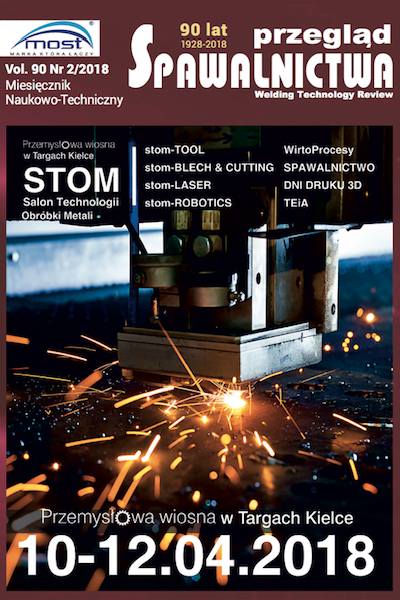Influence of temperature of friction stir welding process with mixing FSW on the strength of the weld
##plugins.themes.bootstrap3.article.main##
Abstrakt
The use of heating leads to reducing plastic deformations of thin sheets welded by the FSW method. Preheating increases the process temperature and allows higher feed rates to be used, thus reducing the time of the proc- ess. Tests made on connections with the same parameters showed much higher tensile strength in the case of using heating. Thermal imaging studies have shown the heat dissipation process and it has been noticed that the initial temperature is significantly lower, which undoubtedly results in the formation of a lower strength weld.
Pobrania
##plugins.themes.bootstrap3.article.details##
Creative Commons CC BY 4.0 https://creativecommons.org/licenses/by/4.0/
Artykuły czasopisma Welding Technology Review (Przegląd Spawalnictwa) publikowane są w otwartym dostępie na licencji CC BY (licencja Creative Commons Uznanie autorstwa 4.0 Międzynarodowe). Licencja CC BY jest najbardziej otwartą dostępną licencją i uważaną za „złoty standard” w formule otwartego dostępu; jest również preferowany przez wielu fundatorów badań. Licencja ta umożliwia czytelnikom kopiowanie i redystrybucję materiału na dowolnym nośniku i w dowolnym formacie, a także zmienianie, przekształcanie lub budowanie na nim materiału, w tym do użytku komercyjnego, pod warunkiem wskazania oryginalnego autora.
Bibliografia
Dymek S.,Kalemba I., i Blicharski M.: Friction stir welding of aluminium 7136-T76511; Science and Technology of Welding and Joining; 2008.
Kalemba I.: Mikrostruktura i własności połączeń stopów aluminium wykonanych metodą zgrzewania tarciowego z mieszaniem materiału zgrzeiny; rozprawa doktorska; Kraków 2010.
Kocańda D., Góra A.: Nowe technologie łączenia tarciowego metali; Biuletyn WAT; 2010, Tom LIX, 2.
Lityńska L., Braun R., Staniek G., Dalle Donne C., Dutkiewicz J.: TEM study of the microstructure evolution in a friction stir-welded AlCuMgAg alloy; Materials Chemistry and Physics, 81, 2003.
Ochałek K.: Zgrzewanie tarciowe z przemieszaniem blach cienkościennych; Przegląd Mechaniczny, 1/ 2017.
Pietras A., Zadroga L.: Rozwój metody zgrzewania tarciowego z mieszaniem materiału zgrzeiny (FSW) i możliwości jej zastosowania; Biuletyn Instytutu Spawalnictwa, 5, 2003.
Pietras A., Zadroga L., Łomozik M.: Charakterystyka zgrzeiny utworzonej metodą zgrzewania z mieszaniem materiału zgrzeiny (FSW); Biuletyn Instytutu Spawalnictwa, 47, 2003.
